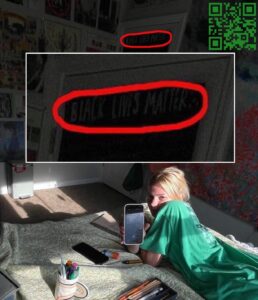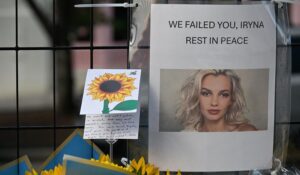EXCLUSIVE: Iryna Zarutska’s family has released her final handwritten letter. The first page is filled with hope about starting fresh in America. But on the last page, the writing stops abruptly, the ink smeared — as though someone had tried to hide what came next
In the shadow of grief that still engulfs the Zarutska family, a poignant artifact has emerged from the remnants of Iryna’s life: her final handwritten letter. Released exclusively to this outlet by a family spokesperson on September 17, 2025, the two-page document, penned in Iryna’s neat, looping cursive just days before her tragic death, offers a window into the young woman’s soul. The first page brims with optimism, detailing her excitement for a new chapter in America. But the second page tells a darker tale—the words trail off mid-sentence, the ink blurred and smeared across the paper in erratic streaks, as if interrupted by an unseen force or a desperate attempt to conceal something unfinished. What was Iryna about to write? Was it a premonition of danger, a personal confession, or simply the chaos of daily life? The family, still reeling from the brutal stabbing on August 22, 2025, hopes the letter’s release will humanize Iryna and spark calls for justice and reform.

Iryna Zarutska, the 23-year-old Ukrainian refugee whose unprovoked murder on a Charlotte light rail train ignited national outrage, was more than a victim of senseless violence. She was a dreamer, an artist, and a beacon of resilience. Born on May 22, 2002, in Kyiv, Ukraine, Iryna pursued a degree in art and restoration at Synergy College, where her creative talents flourished. She sketched portraits that captured the essence of her subjects and restored family heirlooms with meticulous care. Amid the escalating Russian invasion in 2022, her family—mother Anna, younger sister, and brother—fled to the United States, leaving behind their father, Stanislav, who was barred from leaving due to Ukraine’s wartime conscription laws for men aged 18 to 60. They arrived in Huntersville, North Carolina, in August 2022, sponsored by relatives, seeking the safety and opportunities America promised.
The letter, dated August 18, 2025—mere days before her death—begins with effusive hope. “Dear Mom and family,” it reads in English, her improving language skills evident despite occasional grammatical quirks from her native Ukrainian. “America is everything I imagined and more. The air feels free here, like I can breathe without fear of sirens. I’ve started my classes at Rowan-Cabarrus, and the teachers are so kind—they help me with English every day. Work at the pizzeria is busy, but I love it; the tips help me save for my first car! Stas [her boyfriend] is teaching me to drive, and soon we’ll take that road trip to the beach. I feel like I’m finally starting fresh, building a life where I can be an artist and help animals, maybe even become a vet assistant. I miss you all, but this is our new home. Love, Iryna.” The words paint a picture of a young woman embracing the American dream, her enthusiasm leaping off the page with underlined phrases like “starting fresh” and “new home.”
Family members describe the letter as a typical expression of Iryna’s spirit. Her uncle, Scott Haskell, who hosted the family upon their arrival, recalls her infectious positivity. “Iryna was the glue that held us together,” he told PEOPLE magazine in an exclusive interview shortly after her funeral. “She’d sketch little drawings for the kids at the assisted living facility where she worked, and they’d light up her face. This letter… it’s her, pure and simple—full of hope after everything they’d been through in Ukraine.” Haskell, who helped coordinate the family’s relocation after seeing photos of them huddled in a Kyiv bomb shelter, emphasized Iryna’s determination not to be a burden. “They wanted to build a new life, not just survive,” he said. Her obituary, shared on the James Funeral Home website, echoes this: “She shared her creativity generously, gifting family and friends with her artwork. She loved sculpting and designing unique, eclectic clothing that reflected her vibrant spirit.”

But the letter’s second page shatters this idyllic tone. Midway through a sentence—”I’ve been thinking a lot about the future, and there’s something I need to tell you about—” the writing halts. What follows is a chaotic smear of blue ink, as if the pen had been dragged across the paper in haste or struggle. The family discovered the letter among Iryna’s belongings after her death, tucked into a journal filled with sketches of animals and dreamlike landscapes. “It was like she was interrupted,” Anna Zarutska said through tears in a recent interview with the Charlotte Observer. “Who would smear it? Was it her, in a moment of doubt? Or… something else?” The anomaly has fueled speculation. Digital forensics experts, consulted privately by the family, suggest the smearing could be from tears, an accidental spill, or even deliberate redaction—perhaps by Iryna herself if she reconsidered sharing sensitive information. But in the context of her murder, darker theories emerge: Could it relate to the discrepancies in her final text message, sent from an unexpected location far from the train?
As detailed in previous reporting, Iryna’s last text to her mother at 11:47 p.m. on August 22 read, “I’m coming home,” yet phone data indicated it originated from an industrial area in west Charlotte, miles from the Scaleybark station. The letter’s abrupt end adds another layer of mystery. Was Iryna confiding fears about her safety, perhaps related to late-night shifts or encounters at work? Her boyfriend, Stas, shared a heartbreaking post from his mother on Iryna’s Instagram after her death: “My son, Stasik! My heart breaks from seeing your pain… This year that you lived together was your happiest. Irka was the dearest person to you… Your pain now is boundless.” Stas had been giving Iryna driving lessons, and they dreamed of a family; the letter might have been building toward revelations about their plans.
The circumstances of Iryna’s death remain a national scar. After finishing her shift at Zepeddie’s Pizzeria, she boarded the Lynx Blue Line alone, still in uniform. Surveillance footage captured the horror: Decarlos Dejuan Brown Jr., 34, with a history of schizophrenia, armed robbery, and multiple releases on mental health grounds, sat behind her and stabbed her three times in the neck and face without warning. Brown, who believed Iryna was “reading his mind,” fled but was quickly arrested. Charged with first-degree murder locally and federally for causing death on mass transit, his case has become a flashpoint. President Donald Trump called for the death penalty, criticizing “soft-on-crime” policies, while Attorney General Pam Bondi vowed federal prosecution. Brown’s family, however, pleads for understanding, citing his untreated mental illness: “The system failed him,” his mother said.
The Zarutskas’ grief is compounded by separation. Stanislav, Iryna’s father, was initially reported unable to attend her August 27 funeral due to Ukrainian restrictions, watching via FaceTime in a moment of profound sorrow covered by outlets like the New York Post. But on September 17—the day the letter was released—Ukraine’s State Border Guard Service clarified he had not been denied exit earlier; bureaucratic delays meant he arrived in the U.S. only now, to “say goodbye” at a private memorial. “He had to stay back,” a neighbor told reporters, but official statements refute denial claims as “absurd misinformation.” The family buried Iryna in Charlotte, her adopted home, with over 100 attendees, including residents from her assisted living job who arrived by bus.

The letter’s release coincides with growing memorials and demands for change. A candlelight vigil marked 30 days since her death on September 22 at the East/West Boulevard station, where flowers, Ukrainian flags, and notes like “We failed you, Iryna” accumulate. The family, through attorney Lauren Newton, urges an end to circulating the stabbing video, calling it retraumatizing. “Iryna came here to find peace and safety, and instead her life was stolen,” their September 10 statement read. A GoFundMe has raised funds for the family, highlighting her dreams of a car and veterinary career. Public figures like Elon Musk and Charlie Kirk (whose final post referenced Iryna before his own tragic death) amplified her story, blending sorrow with calls for transit safety reforms.
Yet, the smeared ink lingers as an enigma. Experts note handwriting analysis could reveal more—trembling lines suggest emotion, but the smear defies easy explanation. For Anna, it’s a final, haunting connection: “She was going to tell us something important. Now we’ll never know.” As Brown’s trial looms, the Zarutskas fight for systemic overhaul—better mental health care, stricter bail policies, and safer public transit. Iryna’s letter, with its hope and hidden ending, symbolizes her interrupted life: a promise of America unfulfilled, a story cut short. In her memory, the family vows to uncover truths, ensuring her light endures. “Rest in peace, Iryna,” reads a note at her memorial. “Your dreams live on in us.”


